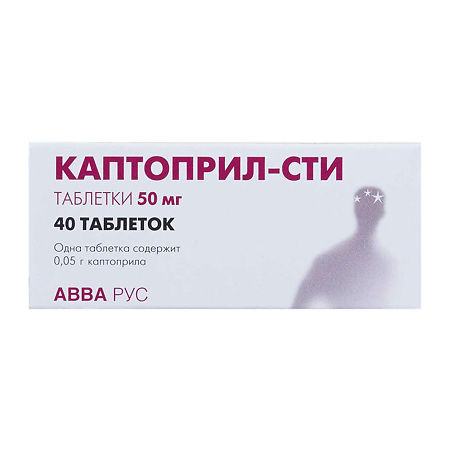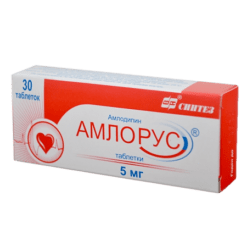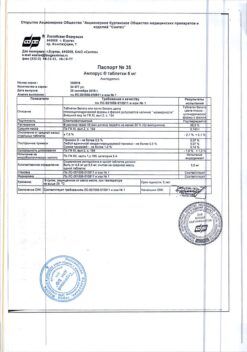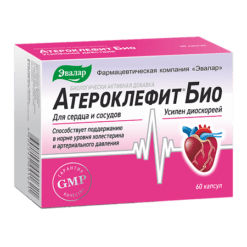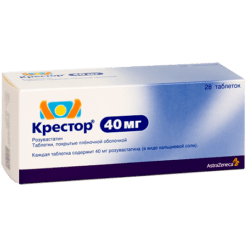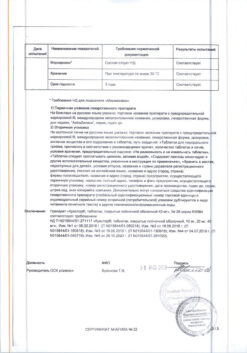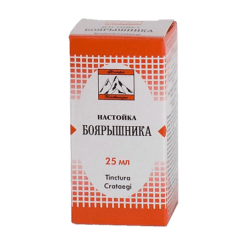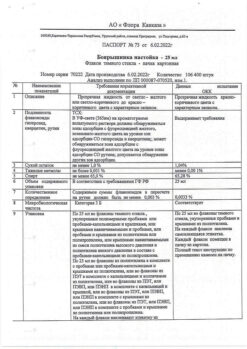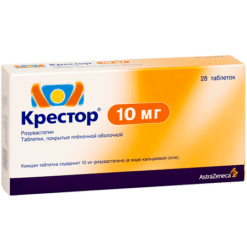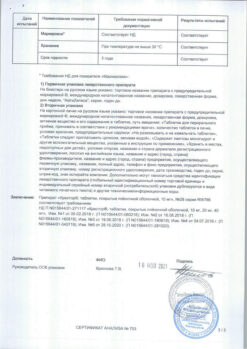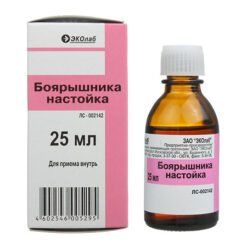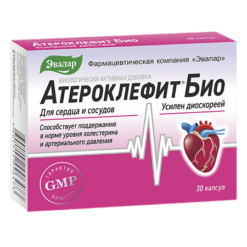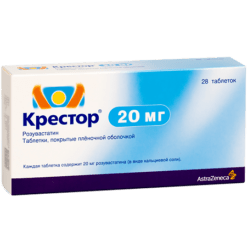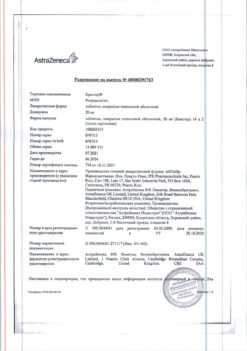No products in the cart.
Captopril STI tablets 50 mg, 40 pcs.
€1.00
Out of stock
(E-mail when Stock is available)
Description
Captopril is an angiotensin-converting enzyme (ACE) inhibitor
The mechanism of antihypertensive action is associated with competitive inhibition of ACE activity, which leads to a decrease in the rate of conversion of angiotensin I to angiotensin II, which is a powerful vasoconstrictor. The decrease in angiotensin II concentration results in a secondary increase in plasma renin activity by eliminating the negative feedback of renin release and directly reducing aldosterone secretion. In addition, captopril appears to influence the kinin-callicrein system by inhibiting the breakdown of bradykinin.
Because of its vasodilator effect, it reduces total peripheral vascular resistance (postload), congestion pressure in pulmonary capillaries (preload) and pulmonary vascular resistance; it increases cardiac minute volume and exercise tolerance. With long-term use, it reduces the severity of left ventricular myocardial hypertrophy, prevents the progression of heart failure and slows the development of left ventricular dilatation.
It decreases tone of renal tubular arterioles, thus improving intra-column hemodynamics and prevents development of diabetic nephropathy.
Indications
Indications
Active ingredient
Active ingredient
Composition
Composition
How to take, the dosage
How to take, the dosage
In case of oral administration, the initial dose is 6.25-12.5 mg 2-3 times a day. If the effect is insufficient, the dose is gradually increased to 25-50 mg 3 times per day. The daily dose should be reduced if renal function is impaired.
The maximum daily dose is 150 mg.
Interaction
Interaction
In concomitant use with immunosuppressants, cytostatics the risk of leukopenia increases.
Concomitant use with potassium-saving diuretics (including spironolactone, triamterene, amiloride), potassium preparations, salt substitutes and food supplements containing potassium may lead to hyperkalemia (especially in patients with renal impairment).Because ACE inhibitors decrease the content of aldosterone, which leads to potassium retention in the body against the background of potassium excretion restriction or its additional intake.
The simultaneous use of ACE inhibitors and NSAIDs increases the risk of renal dysfunction; hyperkalemia is rare.
Concomitant use with “loop” diuretics or thiazide diuretics may cause significant arterial hypotension, particularly after the first dose of diuretics, probably due to hypovolemia, which leads to transient enhancement of antihypertensive effect of captopril. There is a risk of hypokalemia. There is an increased risk of developing renal function abnormalities.
Serious arterial hypotension is possible when used concomitantly with anesthetics.
In concomitant use with azathioprine anemia may occur due to inhibition of erythropoietin activity caused by ACE inhibitors and azathioprine. There have been described cases of leukopenia, which may be associated with additive suppression of bone marrow function.
Concomitant use with allopurinol increases the risk of hematologic disorders; there have been described cases of severe hypersensitivity reactions, including Stevens-Johnson syndrome.
The co-administration of aluminum hydroxide, magnesium hydroxide, magnesium carbonate decreases the bioavailability of captopril.
Acetylsalicylic acid in high doses may decrease the antihypertensive effect of captopril. Whether acetylsalicylic acid reduces the therapeutic efficacy of ACE inhibitors in patients with CHD and heart failure has not been definitively established. The nature of this interaction depends on the course of the disease. Acetylsalicylic acid, by inhibiting COX and prostaglandin synthesis, may cause vasoconstriction, which leads to decreased cardiac output and deterioration in patients with heart failure receiving ACE inhibitors.
There have been reports of increased plasma concentrations of digoxin when concomitant use of captopril with digoxin. The risk of drug interaction is increased in patients with impaired renal function.
Concomitant use with indomethacin, ibuprofen decreases antihypertensive effect of captopril, probably due to inhibition by NSAIDs of prostaglandin synthesis (which is believed to play a role in development of hypotensive effect of ACE inhibitors).
In concomitant use with insulin and hypoglycemic agents with sulfonylurea derivatives, hypoglycemia may develop due to increased glucose tolerance.
In concomitant use of ACE inhibitors and interleukin-3, there is a risk of arterial hypotension.
In concomitant use with interferon alpha-2a or interferon beta, cases of severe granulocytopenia have been described.
When switching from clonidine to captopril, the antihypertensive effect of the latter develops gradually. If clonidine is abruptly withdrawn, patients receiving captopril may experience a sharp increase in BP.
Concomitant use of lithium carbonate increases serum lithium concentration accompanied by intoxication symptoms.
Concomitant use with minoxidil, sodium nitroprusside increases the antihypertensive effect.
Concomitant use with orlistat may decrease the effectiveness of captopril, which may lead to increased BP, hypertensive crisis, a case of cerebral hemorrhage has been described.
The simultaneous use of ACE inhibitors with pergolide may increase the antihypertensive effect.
Concomitant use with probenecid decreases renal clearance of captopril.
Concomitant use with procainamide may increase the risk of leukopenia.
Concomitant use with trimethoprim poses a risk of hyperkalemia, especially in patients with renal impairment.
Concomitant use with chlorpromazine causes a risk of orthostatic hypotension.
In concomitant use with cyclosporine there have been reports of acute renal failure and oliguria.
It is believed that there may be a decrease in the effectiveness of antihypertensive agents when used concomitantly with erythropoietins.
Special Instructions
Special Instructions
Caution should be exercised when there is a history of angioedema on therapy with ACE inhibitors, hereditary or idiopathic angioedema, aortic stenosis, cerebro- and cardiovascular diseases (including cerebrovascular insufficiency, CHD, coronary artery disease), severe autoimmune diseases of connective tissue (including SLE, scleroderma).including SLE, scleroderma), inhibition of medullary hematopoiesis, diabetes mellitus, hyperkalemia, bilateral renal artery stenosis, artery stenosis of the only kidney, conditions after renal transplantation, renal and/or hepatic insufficiency, with sodium-restricted diet, conditions accompanied with reduction of the blood circulation (including diarrhea, vomiting), elderly patients.
In patients with chronic heart failure, captopril should be used under close medical supervision.
Hypotension that occurs during surgical intervention during administration of captopril is corrected by replenishing fluid volume.
The concomitant use of potassium-saving diuretics and potassium preparations should be avoided, especially in patients with renal insufficiency and diabetes mellitus.
When taking captopril, a false-positive urine test for acetone may be observed.
The use of captopril in children is possible only if other drugs are ineffective.
Impact on driving and operating machinery
Caution is necessary when driving vehicles or performing other work requiring increased attention because dizziness may occur, especially after the initial dose of captopril.
Contraindications
Contraindications
Pregnancy, lactation, age under 18 years, hypersensitivity to captopril and other ACE inhibitors.
The use in liver function disorders
Precaution should be used in patients with hepatic impairment.
The use in impaired renal function
Caution should be used in conditions after renal transplantation, renal failure.
The daily dose should be reduced if renal function is impaired.
The concomitant use of potassium-saving diuretics and potassium preparations should be avoided in patients with renal impairment.
Caution should be exercised in elderly patients.
Side effects
Side effects
Overdose
Overdose
Similarities
Similarities
Additional information
| Shelf life | See on the package. |
|---|---|
| Conditions of storage | In a dry, light-protected place at a temperature not exceeding 25 °C. |
| Manufacturer | Avva Rus, Russia |
| Medication form | pills |
| Brand | Avva Rus |
Related products
Buy Captopril STI tablets 50 mg, 40 pcs. with delivery to USA, UK, Europe and over 120 other countries.

